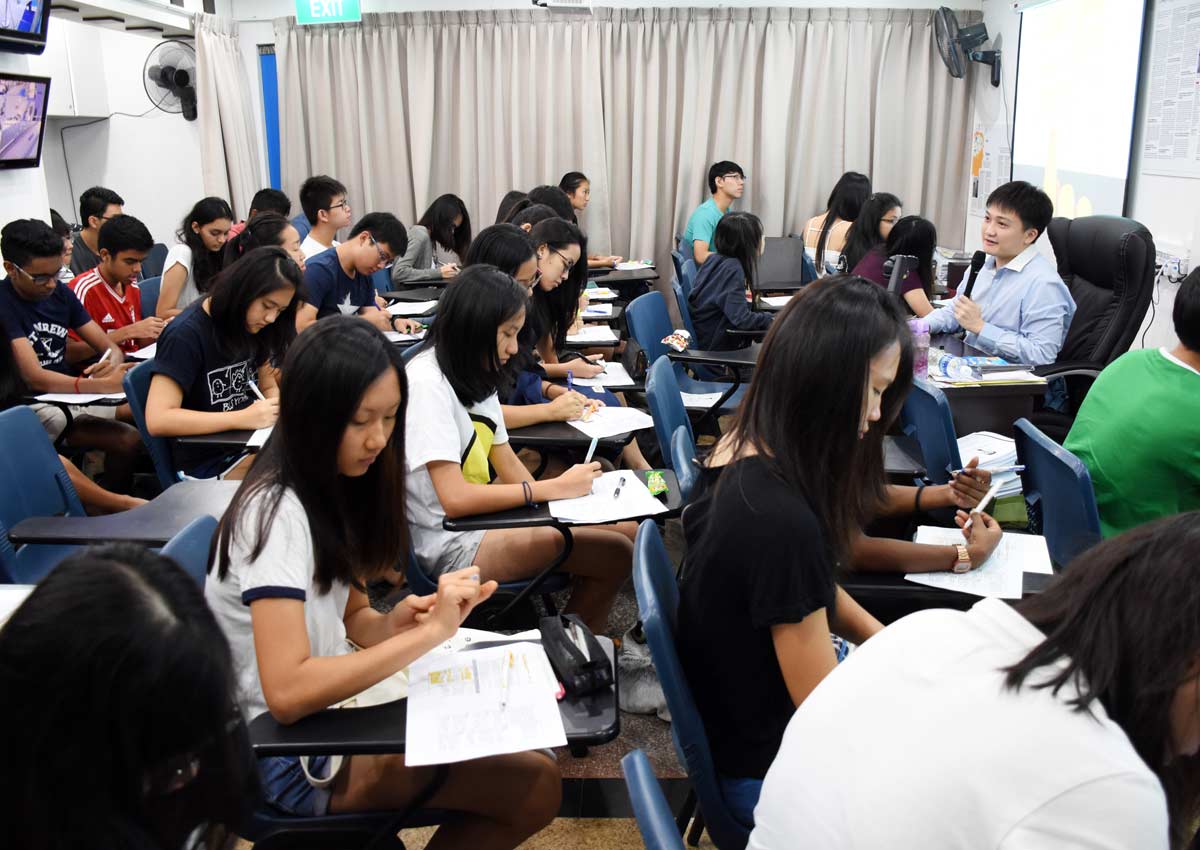Persistent parents call him daily to ask for a place for their child in his A-level economics tuition class. Some try to reserve a spot three years ahead. A few well-heeled ones even offer two years’ fees of $8,000 up front.
Meet economics tutor Anthony Fok, one of a small but growing group of “super tutors” with earnings of at least $1 million a year in fees.
There are at least 10 such private tutors, according to educators in the growing tuition industry. Private tutors like Mr Fok have to register their centres for GST when their annual revenue crosses the $1 million mark.
They are part of a tuition industry worth more than a billion dollars annually, nearly double the $650 million households here spent on tuition in 2004.
“Students look for me because they want their A grade… even those who are already doing well in school,” said 32-year-old Mr Fok, who has about 200 students and 40 names on his waiting list. Some even come from Johor Baru.
According to him, two-thirds of his students have gone on to ace the A-level paper.
His fees range from $380 to $420 for four 1 ½ hour lessons a month. He takes home about $500,000 a year after deducting the rent of his two centres in Bukit Timah and Tampines and other expenses.
Already, the popular timeslots for his classes are fully booked. Each class comprises 30 to 40 students. However, Mr Fok does not intend to open more classes as “there is no way I can cope as a one-man show”.
Mr Fok, who used to teach at a secondary school for about four years, said his achievement is the result of dedication and hard work.
For instance, he gives his mobile number to his students so they can message him whenever they need help. He also assists his students in “spotting” topics likely to appear in exams by analysing past papers, and provides them with concise notes, complete with key pointers.
“The tuition industry is growing rapidly with many tutors entering the industry, lured by the attractive income,” he said. “Top tutors put in a lot of hard work to help students. It’s not an easy industry to be in, fuelled by demanding parents and many competitive tutors.”
Despite noting that good academic grades do not define success, Mr Fok said: “Tuition isn’t a bad thing. I believe that parents’ concerns with grades stem from the desire to give their children the best help they possibly can.”
Second-year Anglo Chinese Junior College student Janine Ang has attended Mr Fok’s classes since last year. She pays $420 per four lessons. From borderline passes, the tutoring has helped Janine, 18 – who will sit her A levels this year – to improve to As in her economics tests and exams.
“It’s worth the fees in exchange for the results,” she said.
Physics tutor Phang Yu Hon, a 49-year-old who collected $1.1 million in fees last year, said parents are willing to fork out for tutors known to deliver results. He has been hitting the million-dollar mark since 2011.
His fees for his O- and A-level classes range from $400 to as much as $700 for four two-hour lessons. Each of his classes averages about 25 students.
His students – he handles 200 a year – are mostly from the upper- middle income group, and include sons and daughters of business owners, medical professionals, senior civil servants and academics.
“Their parents are less concerned about cost and more focused on the tutor’s track record,” said the former research engineer, who has a first-class honours degree in electrical engineering.
Some of his students told The Straits Times that their results have seen marked improvement.
Former CHIJ St Nicholas Girls’ School student Ivana Ding, for instance, had been consistently doing poorly in physics before attending Mr Phang’s classes in March last year.
At the O levels last year, the 17-year-old, now a first-year biomedical sciences student at Ngee Ann Polytechnic, scored A2 for the subject with his help.
“Mr Phang makes the difficult concepts easier to digest through analogies as well as dances and songs he choreographed and composed. These all made physics not only fun but also easier to study,” she said.
But not every tutor makes it into the top league. Mr Phang believes such tutors possess a charisma that others do not.
In recent years, a crop of new tutors are slowly making a name for themselves in the business.
Former teacher Wynn Khoo, who taught physics and principles of accounts for the past five years, made the switch to full-time tutoring this January. Already, the 31-year-old, who charges $280 to $320 per four lessons, has around 100 students.
Top tutors also insist that top marks is not a guarantee, as students have to put in hard work too.
Maths tutor Gary Ang, 37, who draws a five-figure monthly salary, said: “Parents sometimes think tutors are magicians who can turn a failing student into an A student overnight. If the student is willing to work hard, then yes, there will be results.”
Another maths tutor, Ms Celine Loi, who is director of Joss Sticks Tuition Centre, said that students needed to take ownership of their studies, attend classes on time and work with the tutors.
The 40-year-old’s centre, which employs 20 tutors, runs about 55 classes a week, for about 400 students.
But education experts such as National University of Singapore lecturer Kelvin Seah believes that sending students to star tutors may be counterproductive.
Dr Seah said engaging the services of such star tutors may not guarantee better academic grades.
“When students are forced into tuition lessons, they could grow to dislike the subject instead of taking a greater interest in it,” he added.
calyang@sph.com.sg

This article was first published on May 23, 2016.
Get a copy of The Straits Times or go to straitstimes.com for more stories.






